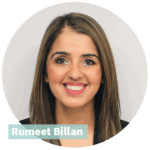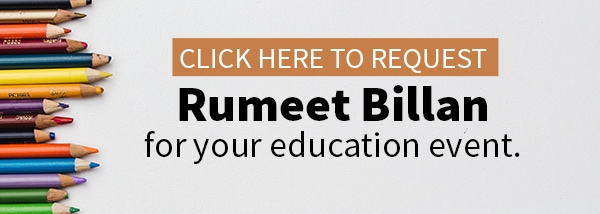Education Speakers | Developing Flexible Skillsets in Students
The pressure put on children to know exactly what they want to be when they grow up is resulting in widespread anxiety amongst students like never before. It starts at an early age with course selection which puts students on a specific track. Once on that track, it becomes ineffective (and often difficult) to transition to another track. We’ve created a system which obstructs flexibility. Educators are looking at how they can better equip students with flexible skillsets for the future. It starts with an oft-used question:
“What do you want to be when you grow up?”
Students of all ages have encountered this question, we all have. Traditionally esteemed roles like doctors, lawyers, ballerinas, and sports superstars are common answers but according to Dr. Rumeet Billan, leadership and emotional resilience advisor, this question limits children’s potential.
Event planners, if you’re looking to bring fresh, science-backed learning strategies that educators can take back to their classrooms to create happier, more self-aware students, Rumeet’s Future of Education presentation is a must-hear talk for your audience.
—
Teaching Resilience
For almost two decades, Rumeet has been committed to reimagining education, uncovering potential, and teaching resilience techniques to the education sector. She’s participated in initiatives focused on suicide prevention in youth and is currently a consultant for the School Board in the Greater Toronto Area as well as an award-winning instructor at McMaster University.
As President and Chief Learning Architect of Viewpoint Leadership, Rumeet focuses her efforts on creating and amplifying opportunities in education, learning, and development. Through keynotes, workshops, and other programs Rumeet helps audiences build resilience, emotional intelligence, and psychological capital. It can be applied to environments such as classrooms, workplaces, communities, and organizations.
Future-Ready Skill Development
How do you prepare children and students for a future where, according to Dell Technologies, 85% of jobs that will exist have not been invented yet? Rumeet has worked for almost two decades in education encouraging healthy mental awareness in youth. In order to remove the limitations created by labels, Rumeet proposes a subtle shift in language to create new, empowering conversations about future-ready skills and careers. It requires asking “Who do you want to become when you grow up?” instead of “what do you want to be?”
This approach encourages children to live in possibility. It is focused on the impact they want to have on the world instead of a job title. Rumeet believes educators can use this framework to guide children and students towards meaningful and fulfilling careers by focusing on transferrable skills they will need to succeed in a future that is uncertain and ever-changing.
Removing Limits on Students’ Potential
When children and students aren’t limited by a job title, they can better explore the possibility of a future filled with meaningful and engaging work. Consider this tip from Rumeet’s interview with the YMCA:
Ask the right questions: Start with Who do you want to be? There is nothing wrong with asking “what do you want to be when you grow up?” but following that up with “why is that important to you?” is critical. It’s one thing to name a position (ie. doctor, lawyer, teacher, etc) but it’s a completely different conversation to discuss the why. “I want to be a doctor because I want to save lives” – the why piece identifies what’s important to the child and where they find purpose and meaning.
The Keynote for Educators
Rumeet’s Future of Education keynote shows audiences:
• What the Future of Education holds for the children and students of today.
• How educators can use subtle shifts in language to promote future-ready skills development and resiliency.
• Tips for parents and educators to help guide children and students on their path to self-discovery.
The award-winning picture book titled ‘Who Do I Want To Become?’ is available as supplementary material for this talk. Rumeet has also created free learning guides for parents and teachers to accompany her book.
“We have received such positive feedback and praise for your exceptional conference presentation. Your captivating insights, professionalism, and enthusiasm to share your experience was noted by many.
Several delegates commented that they sourced relevant and applicable takeaways from your plenary session. Thank you for contributing your insights to positively shape our conference delegates’ experience.”
–Coaching Association of Canada
—
Social Impact
As part of Rumeet’s commitment to social impact, she donated 100 copies of her new book Who Do I Want To Become to rural communities in Nicaragua:
https://twitter.com/RumeetBillan/status/1106158046785490944


